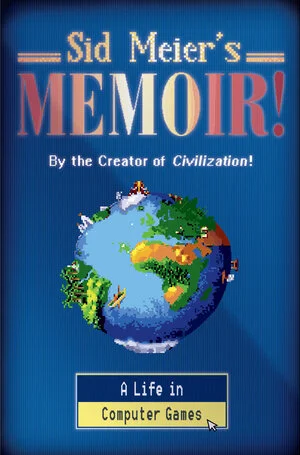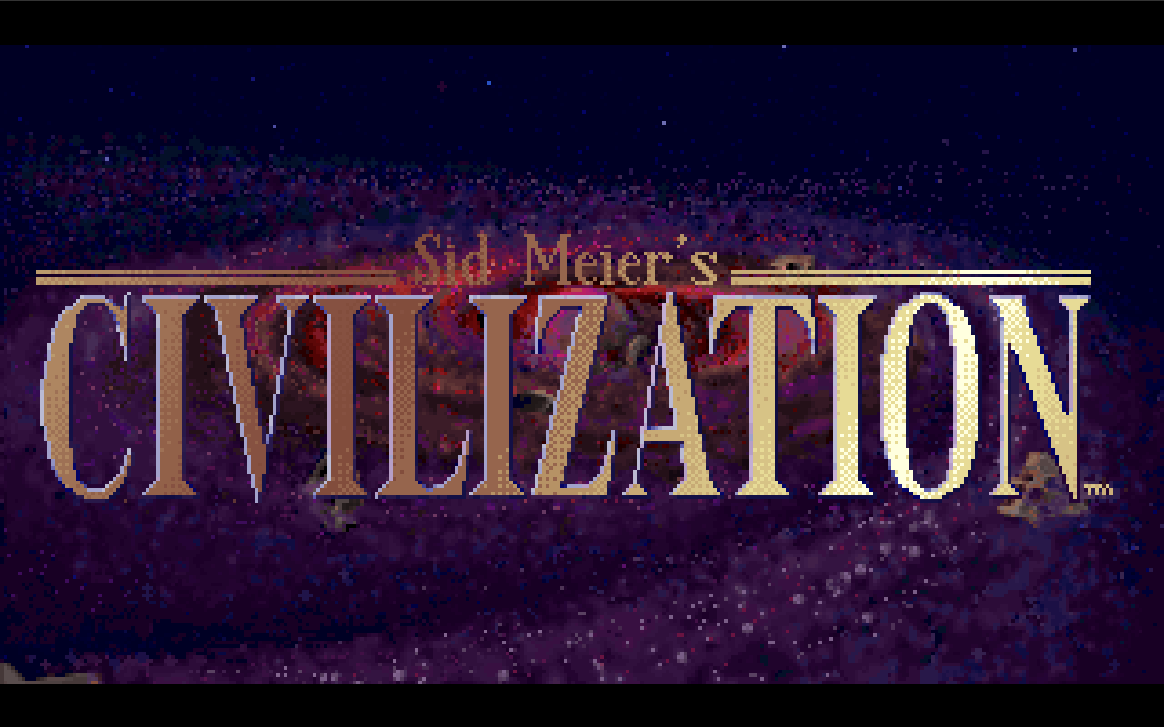Sid Meier's Memoir! (Book)
Christian Haines, Managing Editor
Sid Meier’s Memoir! isn’t an autobiography, not really. It’s more like what in game development you would call “iterations” – repeated revisions of a game project, scrapping some portions of code, reworking others, all in pursuit of a final product that’s not only functional but also fun. Despite its title, this book won’t give you deep insights into Sid Meier’s personal life, even though it does mention his childhood, marriages, children, and faith. It’s not that these things are unimportant to Sid Meier. It’s more that there’s a kind of polite reserve that goes hand in hand with Sid Meier’s conviction that what’s interesting isn’t his life so much as his life’s work. The subtitle of the book is, after all, A Life in Computer Games.
Original Civilization title screen.
And what a life! Although Sid Meier didn’t single-handedly create the strategy-simulation genre, or even the subgenre of 4X (Explore, Expand, Exploit, Exterminate) games, he was one of its founders. Moreover, he’s spent his entire life chiseling away at the genre, reinventing pieces of it, experimenting with others, all in the name of – to borrow his famous formula – giving players a chance to make “interesting decisions.” Meier explains, “Interesting decisions are not about the specifics of what you let the player choose between, but whether the investment feels both personal and significant to the outcome… Ultimately, the most fundamental characteristic of an interesting decision is that it makes the player think, ‘I wonder what would happen next time, if I did it differently?’”
Is this standard too narrow? Not every good game could be described as a series of interesting decisions, right? What about Super Mario Bros. 3? What about Doom? Sid Meier’s games are turn-based. The gameplay swings between a methodical rhythm – you can spend as much time as you would like on each move – and the cascading results of your decisions. Isn’t that worlds apart from the twitch reflexes required by a platformer or a shooter? And yet: in all of these games, players do make choices. Sometimes it’s which gun to use. Sometimes it’s whether or not to use a warp zone to skip levels. But in each case, “a game is not just a vehicle for fun, but an exercise in self-determination and confidence. Good games teach us there are tradeoffs to everything, actions lead to outcomes, and the chance to try again is almost always out there.”
Sid Meier’s Pirates!
Sid Meier! is more than a philosophy, though. He’s also a very particular game designer, one for whom the explicit violence of a Doom or Mortal Kombat has never had much appeal. Even when he’s discussing Gettysburg!, he doesn’t emphasize the gore of soldiers falling in battle. Instead, he focuses on new technologies enabling detailed graphics from an isometric perspective, the ability to play out branching scenarios, and his passion for a map he received as a gift during his childhood. All of this speaks to Sid Meier’s belief not just in the goodness of people but in the chance (if not the guarantee) that the course of history might steer true. Sid Meier believes in people, which seems a more difficult thing to do each day that passes in 2020.
The Civilization series is the epitome of this faith in humanity. For those who have somehow missed them, the games allow you to simulate the history of different civilizations, each with different advantages, and they’ve all featured non-violent win conditions, including most famously building a spaceship to reach the nearest star system, Alpha Centauri. What’s most interesting in Sid Meier’s account of making the first Civilization (1991) is, first, all the ways the game could have been different. It started off as a real-time strategy game, until Sid realized the ticking clock got in the way of the interesting decisions. At one point, instead of charting a linear rise of civilizations, the game featured a cyclical rise and fall of civilizations punctuated by disasters like the eruption of the Krakatoa volcano and the bubonic plague.
Early stage gameplay from Civilization V.
Sid Meier’s approach to design has more than a little in common with his criterion for what makes a good game. It’s all about experimenting with choices, going in one direction, rather than another. It’s about not being afraid to try things out and believing a good version of the whole will emerge from individual choices. As he puts it, “There is no map before you’ve explored the wilderness, and no overriding artistic vision on Day One. There’s just the hard, consistent work of making something a little better each day, and being as efficient as possible in your discovery of what it’s going to turn out to be.” This commitment to iteration, or incremental progress, is Sid Meier’s philosophy of life and society, as well his approach to design.
This faith in progress is also why his games have sometimes been criticized by scholars and activists. Some scholars, for example, have challenged the idea that history moves forward in a linear fashion but also the gameplay mechanic of a single player directing the course of civilization. The sovereignty of the player in such games is a fantasy that neglects not only the damage wrought when individuals accumulate power, but also how many of the greatest accomplishments of the human species were products of social movements. What we call “civilization” is usually shorthand for the wonderful things that get invented when groups of people collaborate.
Sid Meier’s response to these criticisms is at first dismissive and then more reflective. He admits that the progress model of civilization doesn’t reflect reality very well, but he also insists that “moral clarity” is essential for fun – and games need to be fun, otherwise why would anyone continue to play them? I don’t really disagree. As I suggest in a piece on The Last of Us Part 2, even games with dark content need to be fun if they want to inspire conversation. But I wonder what would happen if Sid Meier applied one of his own lessons – namely, that game development is always collaborative – to the Civ series. What would a version of Civilization look like that did away with faith in individual leaders and linear progress in favor of a more complex, more contingent decision-making process? Would it be interesting? Would it be fun?
Sid Meier’s Pirates!
To Sid Meier’s credit he never gets to wrapped up in his own image: Sid Meier! Behind the exclamation point, there’s always a friendly, humble explorer of digital realms. Which is why even if you find fault in his vision of how history works, you can still find his faith in humanity infectious. At its best, it’s a call to experiment with others, to try things out, to build on what’s good in the past, but not to be afraid to scrap things and reinvent: “You can’t decide what something’s going to be before you embark on it, and you shouldn’t stick with a bad idea just because you’re fond of it. Take action as quickly and repeatedly as possible, take advantage of what you already know, and take liberties with tradition. But most importantly, take the time to appreciate the possibilities, and make sure all of your decisions are interesting ones.”






